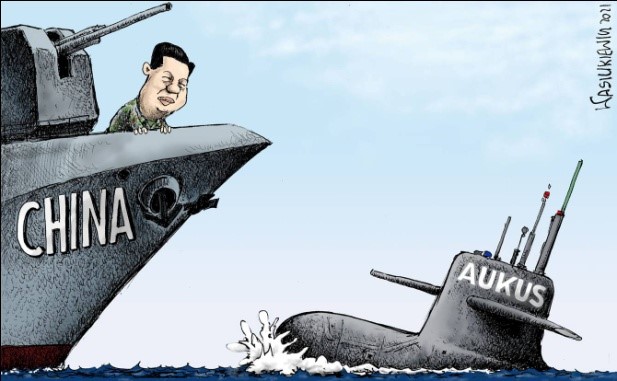Description

Disclaimer: Copyright infringement not intended
Context: Formation of a new trilateral security partnership called AUKUS (Australia-U.K.-U.S.).
AUKUS aim: to “update and enhance shared ability to take on the threats of the 21st century.
What are the terms of the grouping?
- Intent for AUKUS is to preserve a free and open Indo-Pacific in the long term.
- It drew a sharp response from China, whose territorial ambitions across the Indo-Pacific may well have been a key factor behind the formation of this group.
- Beijing’s consternation that AUKUS will “undermine” regional peace and “intensify” an arms race.
- Cornerstone of AUKUS: U.S. and the U.K. will transfer technology to build a fleet of nuclear-powered submarines for Australia within 18 months.
Will AUKUS be a game changer?
- The short answer is that it is unlikely.
Reasons are
- First, the S., as a leading global military power, already has a strong presence in the Indo-Pacific, especially in a grouping that includes Australia, India, and Japan — the Quadrilateral Security Dialogue, or Quad.
- Similarly, the U.S., the U.K., Australia, Canada, and New Zealand are members of Five Eyes, an intelligence-sharing alliance, which also has regional security implications.
- Secondly, AUKUS will not likely deter Beijing’s strategic calculus across the region, particularly relating to its maritime ambitions and territorial expansionism.
- The one element of AUKUS that has potential to cause a recalibration of China’s plans in this realm is the nuclear-powered submarines.
- The countries that have such submarines operational are the U.S. (68), Russia (29), China (12) the U.K. (11), France (8) and India (1).
- It will raise the stakes over strategic flashpoints such as the South China Sea and Taiwan.
Does India stand to gain from this development?
- New Delhi may derive secondary benefits from having three advanced nations with arguably the most sophisticated military know-how in the world coming together to support a free and open Indo-Pacific.
- Given the inroads that Beijing has made in recent decades with its Belt and Road Initiative, including through projects or proposals for infrastructure development in Southeast Asia, Sri Lanka, the Maldives, and beyond into Central Asia, fears in South Block over ‘encirclement’ by China may be partially mitigated by AUKUS.
- India will work with the transnational institutional arrangements in place, roping in like-minded nations into symbiotic partnerships, and calibrate future alliance plans to evolving security situations across one of the most complex strategic ecosystems in the world.
https://www.thehindu.com/news/international/explained-will-aukus-upset-the-indo-pacific-balance/article36674358.ece?homepage=true















